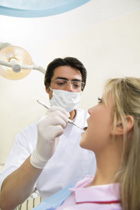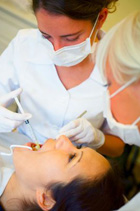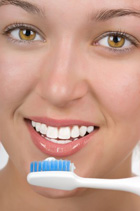 Taking excellent care of your teeth begins with what you do at home, of course. Brushing and flossing at least twice a day and maintaining a healthy diet and lifestyle should mean that your teeth and gums are generally healthy and optimally functional. But there is always the chance that a condition might be developing in your mouth. If you are in regular contact with your dentist then it can be diagnosed before it gets worse.
Taking excellent care of your teeth begins with what you do at home, of course. Brushing and flossing at least twice a day and maintaining a healthy diet and lifestyle should mean that your teeth and gums are generally healthy and optimally functional. But there is always the chance that a condition might be developing in your mouth. If you are in regular contact with your dentist then it can be diagnosed before it gets worse.
You ought to be visiting your dentist every six months so that your mouth can be examined by a trained professional who is expert in all areas of your mouth. They will take a close look at your teeth and gums and compare the state of your mouth with the records they have from your previous visits.
In doing so they can be on the look out for the development of conditions that you simply might not have yet noticed. A surprising amount of people suffer from gum disease and don’t notice that they have it in the early stages. It might just go away but it might develop into something worse. Allowing your dentist to examine your mouth gives you a chance of having one of these conditions diagnosed so that it can be effectively treated, returning your mouth to excellent health.
Dental practice has changed a lot in recent years and you might be surprised to find out that dentists are now increasingly concerned with relaxing their patients and putting them at ease. Dental appointments are usually a lot quicker than they used to be thanks to modern technology, so having a busy life is no excuse. Make an appointment for a dental check up with your City of Leeds dentist.





 Taking care of your teeth ought to go hand in hand with looking after your gums as well. The sad fact is that all too often gum problems go unnoticed and are actually a greater cause of tooth loss than dental decay itself. In conjunction with regular visits to your City of Leeds dentist, you should be able to recognise the signs of periodontal disease so that it can be treated before it gets worse.
Taking care of your teeth ought to go hand in hand with looking after your gums as well. The sad fact is that all too often gum problems go unnoticed and are actually a greater cause of tooth loss than dental decay itself. In conjunction with regular visits to your City of Leeds dentist, you should be able to recognise the signs of periodontal disease so that it can be treated before it gets worse. It seems fairly obvious to most people that looking after the health of their teeth and gums is very important. We all know that good oral hygiene can help to keep the teeth and gums free of plaque and bacteria, and that this will prevent dental problems but recent research has shown there may be a much more significant reason to keep our oral hygiene at a very high level.
It seems fairly obvious to most people that looking after the health of their teeth and gums is very important. We all know that good oral hygiene can help to keep the teeth and gums free of plaque and bacteria, and that this will prevent dental problems but recent research has shown there may be a much more significant reason to keep our oral hygiene at a very high level. Looking after the health of your teeth and gums is not just important for your mouth but could also make a difference to your overall health. With dental decay on the increase due to an increase in sugary diets and worsening standards of oral hygiene, and gum disease affecting nearly three quarters of all adults in the UK at some stage in their life, it is more important than ever to ensure a good standard of oral care.
Looking after the health of your teeth and gums is not just important for your mouth but could also make a difference to your overall health. With dental decay on the increase due to an increase in sugary diets and worsening standards of oral hygiene, and gum disease affecting nearly three quarters of all adults in the UK at some stage in their life, it is more important than ever to ensure a good standard of oral care. Brushing your teeth is only part of a good oral hygiene regime. Although brushing is very important for removing plaque and keeping teeth clean and free of bacteria, there are other important ways of maintaining the health of your teeth and gums.
Brushing your teeth is only part of a good oral hygiene regime. Although brushing is very important for removing plaque and keeping teeth clean and free of bacteria, there are other important ways of maintaining the health of your teeth and gums. Many forms of dental surgery involve the dentist having an accurate three-dimensional image of the patient’s teeth and gums. In the past this involved making several dental moulds and using them in tandem with conventional x-ray. These would take several days to develop and cast and increased waiting times for all appointments and treatments for all patients.
Many forms of dental surgery involve the dentist having an accurate three-dimensional image of the patient’s teeth and gums. In the past this involved making several dental moulds and using them in tandem with conventional x-ray. These would take several days to develop and cast and increased waiting times for all appointments and treatments for all patients.

